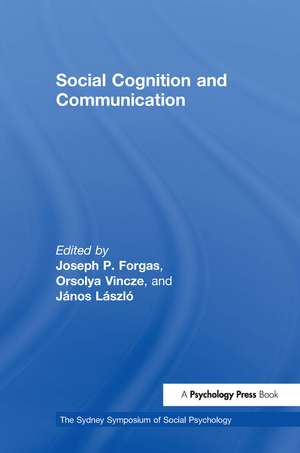Social Cognition and Communication: Sydney Symposium of Social Psychology
Editat de Joseph P. Forgas, Orsolya Vincze, János Lászlóen Limba Engleză Hardback – 31 iul 2013
The chapters address such questions as how are cognitive and identity processes reflected in language? How do affective states influence language production? Are political correctness norms in language use effective? How do partners manage to accommodate to each other’s communicative expectations? What is the role of language as a medium of interpersonal and intergroup influence? How are individual and cultural identities reflected in, and shaped by narratives in literature, school texts and the media?
The book is aimed at all students, researchers and laypersons interested in the interplay between thinking and communication, and should be required reading for all professionals who use language in their everyday work to interact with people.
Din seria Sydney Symposium of Social Psychology
-
 Preț: 342.58 lei
Preț: 342.58 lei -
 Preț: 357.27 lei
Preț: 357.27 lei -
 Preț: 480.02 lei
Preț: 480.02 lei -
 Preț: 436.14 lei
Preț: 436.14 lei -
 Preț: 436.14 lei
Preț: 436.14 lei -
 Preț: 416.22 lei
Preț: 416.22 lei - 15%
 Preț: 464.31 lei
Preț: 464.31 lei -
 Preț: 486.49 lei
Preț: 486.49 lei - 21%
 Preț: 330.92 lei
Preț: 330.92 lei - 15%
 Preț: 453.50 lei
Preț: 453.50 lei - 15%
 Preț: 461.21 lei
Preț: 461.21 lei - 22%
 Preț: 331.60 lei
Preț: 331.60 lei - 18%
 Preț: 1005.80 lei
Preț: 1005.80 lei -
 Preț: 372.07 lei
Preț: 372.07 lei -
 Preț: 413.37 lei
Preț: 413.37 lei -
 Preț: 414.32 lei
Preț: 414.32 lei - 15%
 Preț: 462.65 lei
Preț: 462.65 lei - 15%
 Preț: 438.96 lei
Preț: 438.96 lei -
 Preț: 471.77 lei
Preț: 471.77 lei -
 Preț: 371.76 lei
Preț: 371.76 lei
Preț: 823.26 lei
Preț vechi: 1142.44 lei
-28% Nou
Puncte Express: 1235
Preț estimativ în valută:
157.58€ • 171.23$ • 132.45£
157.58€ • 171.23$ • 132.45£
Carte tipărită la comandă
Livrare economică 21 aprilie-05 mai
Preluare comenzi: 021 569.72.76
Specificații
ISBN-13: 9781848726635
ISBN-10: 1848726635
Pagini: 368
Ilustrații: 34 b/w images, 9 tables and 34 line drawings
Dimensiuni: 152 x 229 x 20 mm
Greutate: 0.64 kg
Ediția:New.
Editura: Taylor & Francis
Colecția Psychology Press
Seria Sydney Symposium of Social Psychology
Locul publicării:Oxford, United Kingdom
ISBN-10: 1848726635
Pagini: 368
Ilustrații: 34 b/w images, 9 tables and 34 line drawings
Dimensiuni: 152 x 229 x 20 mm
Greutate: 0.64 kg
Ediția:New.
Editura: Taylor & Francis
Colecția Psychology Press
Seria Sydney Symposium of Social Psychology
Locul publicării:Oxford, United Kingdom
Recenzii
"Social cognition and communication are intricately intertwined. Our thoughts are shaped by manifold of communications we receive from others with whom we shape the shared realities that lend meaning to our lives. This rare and truly important volume weaves together the strands of these fundamental processes as they manifest themselves in cutting edge research by leading investigators across the many domains where social cognition and communication interface. A fascinating read and a useful reference book for students and academics across the entire landscape of the social sciences" -- Arie W. Kruglanski, Ph.D., University of Maryland, College Park"This topical volume features 18 cutting-edge chapters on the interplay between thought and language, or cognition and communication. The chapters cover topics ranging from cognition and communication in dyads to the socio-political implications of cognition and communication. Masterfully edited, this promises to be a landmark volume in both social psychology and communication. It is suitable for researchers, PhD students, and advanced undergraduates alike." -- Constantine Sedikides, Ph.D., University of Southampton, United Kingdom
Cuprins
I. Introduction Pennebaker, James W. & Chung, Cindy K, Counting little words in big data: the psychology of communities, culture and history. Giles, Howard & Gasiorek, J., Parameters of non-accommodation: refining and elaborating communication accommodation theory. Laszlo, J. & Ehmann, B., Narrative social psychology. Fiedler, K. & Mata, A., The art of exerting verbal influence through powerful lexical stimuli. II. Cognitive and affective influences on communication: Beukeboom, Camiel J., Mechanisms of linguistic bias: How words reflect and maintain stereotypic expectancies. Forgas, Joseph P., Feeling and speaking: affective influences on communication strategies and language use. Kissine, Mikhail & Klein, Olivier, Models of communication, epistemic trust and epistemi vigilance. Abele, Andrea A. & Bruckmuller, Suzanne, Are there systematic differences in describing self vs. others in terms of agentic and communal traits? Koch, Alex, Forgas, Joseph P. & Goldenberg, Liz, In the mood to break the rules: affective influences on linguistic abstraction and adherence to Grice's conversational maxims. III. Communication, identity and group processes Pearson, Adam R. & Dovidio, John F., Intergroup fluency: How processing experiences shape intergroup cognition and communication. Crano, William D & Alvaro, Eusebio M., Social factors that affect the processing of minority-sourced persuasive communications. Peters, Kim and Yoshihisha Kashima., Gossiping as moral social action: A functionalist account of gossiper perceptions. Vincze, Orsolya, Ilg, Barbara & Polya, Tibor., The role of narrative perspective in the elaboration of individual and historical traumas. Cooper, Joel & Trujillo,Matthew., Multiple meanings of communicative acts in the reduction of vicarious cognitive dissonance. IV. Social and cultural influences on communication: Maass, Anne, Suitner, Caterina & Merkel, Elisa., Does political correctness make (social) sense? Fulop, Eva, Cserto, Istvan Ilg, Barbara, Szabo, Zsolt, slugoski, Ben and Laszlo, Janos., Emotional elaboration of collective traumas in histporical narratives; Nencini, Alessio ,Narrative constructions in Italian identity: an investigation into literary texts over time; Catellani, Patrizia & Bertolotti, Mauro, Political communication, social cognitiuve processes and voters' judgments.
Descriere
This volume presents cutting-edge research from leading international scholars investigating the how language shapes our thinking, and how social cognitive processes, in turn, influence language production and communication. The diverse approaches include evolutionary, linguistic, cognitive and affective, as well as the empirical analysis of written and spoken narratives.
